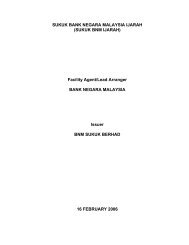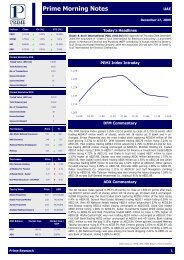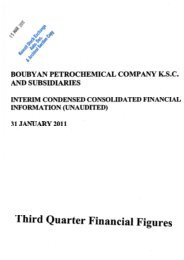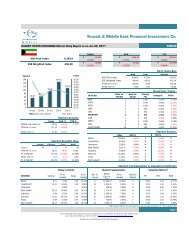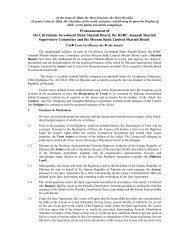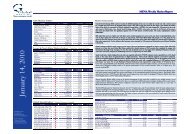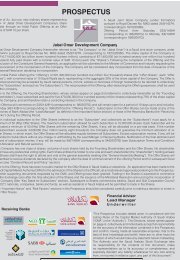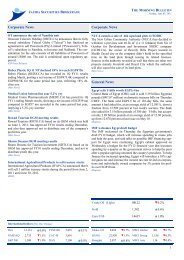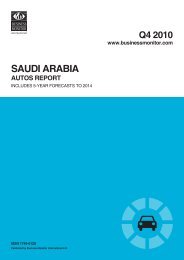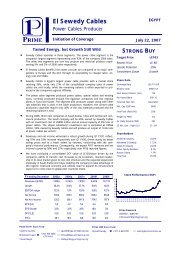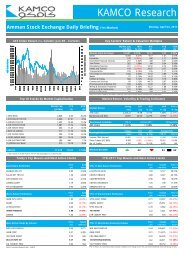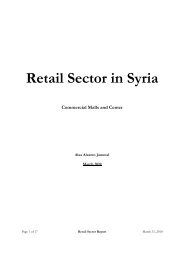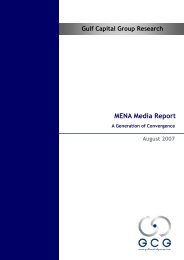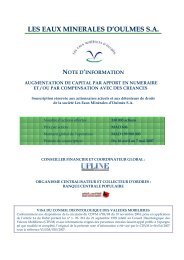You also want an ePaper? Increase the reach of your titles
YUMPU automatically turns print PDFs into web optimized ePapers that Google loves.
14 Libya<br />
Poor families benefit from oil<br />
wealth redistribution<br />
that UniCredit has received is translated into the actual establishment of a joint<br />
venture.<br />
Earlier in August it was announced that the Libyan Investment Authority (LIA), a<br />
sovereign wealth fund, had increased its stake in UniCredit to 2.075% of the bank's<br />
capital. Recent data suggest that the Central Bank already owns around 5% of the<br />
bank, taking the Libyan government's holding to around 7%. The award of the licence<br />
so close to the announcement of the increased stake of the LIA in UniCredit is bound<br />
to attract some criticism and accusations of preferential treatment. This also poses the<br />
possibility that vested interests within the regime could be responsible for derailing<br />
HSBC's bid for the licence. Libyan political machinations are often cast as a battle<br />
between reformers, whom the central bank governor, Farhat Bengdara, is widely<br />
regarded to be among, and a conservative "old guard" that aims to maintain the<br />
status quo. Backroom dealings and power plays between these camps are often used<br />
to explain unusual outcomes or unexpected actions of the Libyan authorities and<br />
may be applicable in this instance.<br />
The LIA, which has around US$65bn at its disposal, is becoming increasingly<br />
acquisitive, taking advantage of the period of low global asset prices. In recent<br />
months, it has acquired holdings in a Russian Aluminium company, RUSAL; in the<br />
world's largest brickmaking firm, Wienerberger of Austria; and in a British media<br />
group, Pearson. It is particularly interested in financial services, not least to gain inhouse<br />
expertise at managing its assets. To this end, it was reported in early August<br />
that it had handed over "a few hundred million dollars" to a newly created asset<br />
manager in London, FM Capital Partners, for it to manage, while at the same time<br />
training up Libyan staff in the field of asset management. The intention is that the<br />
Libyan team will then take hold of the asset portfolio after five years. FM Capital<br />
Partners will make most of its investments in the traditional areas of equities, foreign<br />
exchange, derivatives and commodities. But it will also have a strong focus on Africa,<br />
were about 40% of its investments would be made. Indeed, it is understood that the<br />
Libyan African Investment Portfolio (LAP), a subsidiary of the LIA, put up most of<br />
the funds for the scheme. Africa is a key area of investment for Libya; it already has<br />
significant assets in the sub-Saharan region and at the summit of the Community of<br />
Sahel-Saharan States held in the Chadian capital, N'Djamena, in mid-July, the Libyan<br />
Leader, Colonel Muammar Qadhafi, announced that he was looking to invest<br />
considerably more. He told the audience that "the Libyan Jamahiriya [republic of the<br />
people] has US$90bn waiting for investment markets. The Libya market can absorb<br />
only part of this money. We started by focusing our attention on Africa hoping that it<br />
would absorb these huge sums of money." But he added a caveat, saying that Libya<br />
was looking for markets in the region that had "stability, peace, security, confidence,<br />
real independence, political will and corruption free environment", which provides<br />
additional reasons for not investing in Libya itself.<br />
Local news sources have revealed that Colonel Qadhafi's oil wealth plan, by<br />
which he intended to allocate part of the country's oil revenue directly to poor<br />
families, has benefited 230,815 such families since the scheme's launch in 2006.<br />
According to the report in a Libyan newspaper, Al Jamahiria, 45,912 three-person<br />
households received LD30,000 (US$23,587) each, while 34,362 four-person<br />
households were each allocated LD40,000, and 150,588 households of five or<br />
more people were given LD50,000. In total, the programme has reportedly<br />
distributed funds worth LD10.3bn (US$8.1bn). However, in the government<br />
<strong>Country</strong> <strong>Report</strong> August 2010 www.eiu.com © The Economist Intelligence Unit Limited 2010



